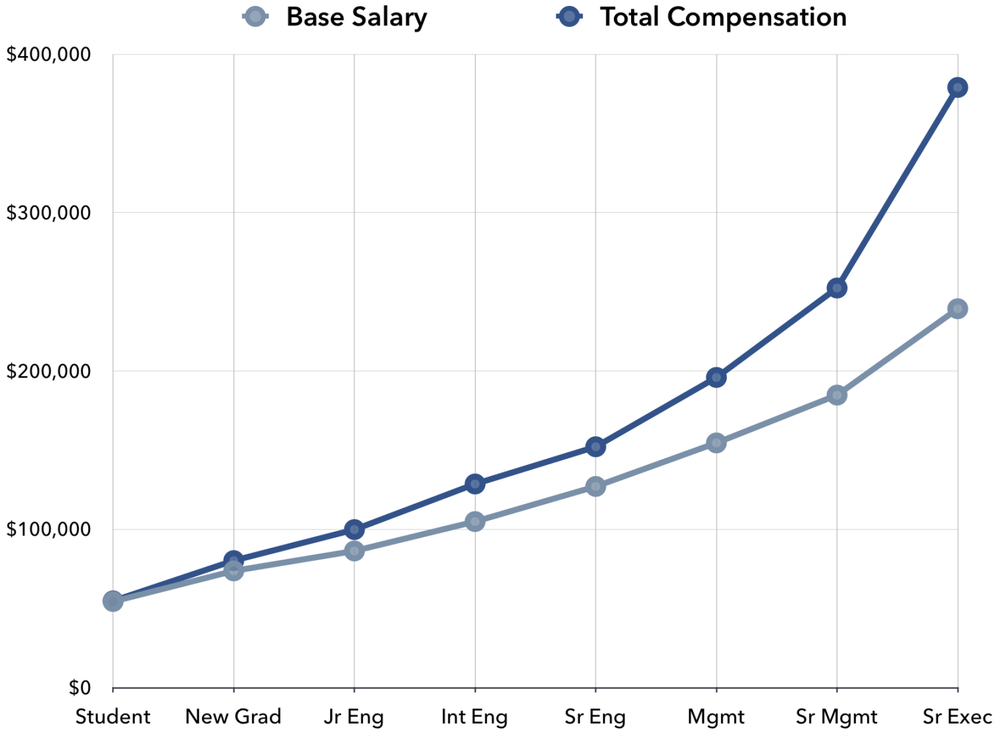
Graduate programs in electrical engineering prepare students in leading positions in the field. They are familiar with circuits, electronic devices, and the basic concepts of digital signals. Some programs also cover renewable energy sources and cellular communication technologies. You have the option to choose from several classes that are focused on a particular area of electrical engineering. To advance your career, you will need a master's Degree in Electrical Engineering.
Circuits classes focus on the use of circuits in electronic devices
A master's in electrical engineering studies the design and application of electronic circuits in a variety applications. This degree requires electrical engineers to be able to communicate well and have a deep understanding of computer systems. They must be familiarized with operating system components and principles.
Modern technology is built on circuits. Some electrical engineers focus on designing large-scale electrical systems, while others work on motor controls, lighting, telecommunication systems, satellite communications, and more. These professionals must be familiar with the differences between analog circuits and digital circuits. They must also have a working knowledge of integrated digital circuits, which are the foundational components of electronics.

Signal integrity classes are designed to teach you the fundamental concepts of digital signals
Master courses in signal integrity cover the basic concepts of digital signals and their integrity. This includes learning about the Fourier series and how these transforms are used in signal processing. The course will also cover the design of adaptive filters using different updating algorithms. In addition, students will learn multirate signal processors.
These courses cover fundamental concepts and algorithms related to digital signal processing. They cover fundamental concepts and algorithms related to digital signal processing. The courses include concepts and applications in signal integrity engineering, as well as transmission line analysis, Maxwell's Equations, and probability and statistics. They will also discuss fundamentals about software defined radio and building AM/FM stations. They will also learn about mathematical models for communication systems and their measurement of bandwidth and capacity.
Wireless communication classes emphasize the use and benefits of cellular communications technology
Wireless communication and cellular communications technologies are becoming an everyday part of life. They have the potential to transform our world. This program will focus on the principles, applications, and design of these technologies. Students in wireless communications and cellular communication programs will develop a wide range of skills and competencies, which they will be able to apply to a variety of fields.
Students can choose to specialize in cellular or wireless communications, or focus on wireless networking. In either case, students need to understand probability and statistics. They will also gain an understanding of the basics and protocols of computer networks.

The classes on renewable energy systems are focused on the use of alternative energy sources
A Master of Science (Master of Energy Engineering) degree can be pursued if your passion is the environment, and you wish to make a real difference in the world. This degree program will teach you about the many different forms of renewable energy and how these energy sources can be integrated into electrical systems. You will also learn about the technological innovation and development of renewable energy systems. You can also interact with experts in the industry to customize the curriculum.
As companies and governments move away fossil fuels, it is expected that the demand for engineers who are skilled in renewable energy will increase. Engineers will be needed to design and construct future renewable energy infrastructure as companies develop new energy sources. Renewable energy engineers need to have a deep understanding of all sources of renewable energy and the engineering skills that go with them. Additionally, they must be proficient in planning and economic aspects for renewable energy integration into the electric grid.
FAQ
Engineering: What does it mean?
Engineering can be described as the application and production of useful things using scientific principles. Engineers use their knowledge of mathematics and science to design and produce machines, vehicles.
Engineers might be involved with research and development as well as production, maintenance and testing. Quality control, sales, marketing and management are all possible.
An engineer can have many responsibilities. These include designing, building products, services, and processes.
Engineers can choose to specialize in specific fields such as electrical, chemical or civil.
Some engineers are more interested in specific types of engineering than others, including aeronautics and biotechnology, computing, electronics energy, industrial, maritime, medicine, nuclear, robotics space transportation, telecommunications and water.
Engineering is a great career choice?
Engineering is an exciting profession where you are constantly learning and improving yourself. It is possible to make a significant impact on people's lives. There are many ways to do it.
Designing products could include cars, planes and trains, as well as computers, phones and mobile phones. You might also develop software or assist in building these devices. Perhaps you'd like to create medical equipment. There are endless possibilities!
Engineers also love working with people to solve problems and come up with solutions. Engineers are always open to learning new things and challenging situations.
Engineering is a good career choice. However, it takes hard work and dedication. Engineering is not about sitting down and watching TV all day. To get the desired results you'll have to put in a lot. But the rewards are worth it.
What jobs are there for engineers?
Engineers can find jobs in almost every industry including manufacturing, transportation energy, communications, finance and government.
Engineers who specialize can often find employment at specific organizations or companies.
You might find electrical engineers working for medical device manufacturers or telecommunications companies.
Software developers might work with websites or mobile app designers.
Tech companies such as Google, Microsoft and Apple may employ computer programmers.
Elon Musk is what kind of engineer?
He is an inventor who enjoys thinking outside the box.
He is also a risktaker.
He isn't afraid of trying new ideas and is willing to take chances.
Elon Musk is an excellent example of someone who thinks differently than others. He doesn't just follow the crowd. Instead, he experiments with his own ideas before deciding whether or not they work. He will change them if they don't work until he comes up with something that does. This allows him to be more creative and problem-solving.
Engineering is difficult to learn?
It all depends on what you mean when you say "hard". If you mean difficult, then yes, but if you mean boring, then no. Engineering is not difficult, but it does require a lot maths and physics.
You can learn to do something if you really want it. You don't have to be an engineer to become an engineer.
Engineering is fun, as long as it's something you like.
Engineering is not difficult if one knows everything. This is false.
The reason engineers think they are boring is because they haven’t done anything else.
They have just kept doing the same thing day in and day out.
But there are many different ways to solve problems. Each method has its pros and cons. So try them all out and see which one works best for you.
What does a Chemical Engineer do, and what are their responsibilities?
Chemical engineers use math, science, engineering, technology, and business skills to develop chemical processes, products, equipment, and technologies.
Chemical engineers can choose to specialize in areas like petroleum refining or pharmaceuticals, food processing, agricultural, textiles and paper, mining, metalurgisty, and power generation.
They collaborate closely with scientists and researchers to solve technical problems.
Statistics
- 2021 median salary:$95,300 Typical required education: Bachelor's degree in mechanical engineering Job growth outlook through 2030: 7% Mechanical engineers design, build and develop mechanical and thermal sensing devices, such as engines, tools, and machines. (snhu.edu)
- 8% Civil engineers solve infrastructure problems. (snhu.edu)
External Links
How To
How to Write Engineering Drawing Letters
The engineering drawings are made up of both architectural drawings (also known by technical drawings) as well as engineering sketches. The first shows the product’s physical features. While the second shows how the product should appear. Each type includes detailed specifications, dimensions and symbols as well as text and arrows. Engineers write these documents in their own language. These terms refer to specific units, abbreviations and acronyms. These terms are also known as engineering terminology. This article will explain their meaning.
A letter is a formal document written by an individual or organization to another person or organization. It typically includes a greeting and salutation, signature as well as date and closing remarks. A self-introduction is a common addition to most letters. Some letters may include business details, such a legal agreement. Some letters may contain only greetings or signatures.
Engineers draw and design diagrams using their professional knowledge. Engineers must use precise language to communicate their work. Technical terms describe the product and process as well as materials and methods.
Engineers use many different terms to describe things. To talk about electric current, engineers use the term "ampere". Or they say "kilogram per meter squared" to measure mass. These terms are called scientific numbers. Other engineers call them common names because they are commonly used. Common names are easier to remember and understand.
Technical terms are often abbreviated. A abbreviation is a shorter word. Example: "kW" means kilowatt. The term "KW" is a kilowatt. You don’t have to know the whole name.
Engineers may also use many acronyms and abbreviations other than technical terms. These are similar to abbreviations, but they are composed of multiple words. Examples include "IEC," DIN," and ANSI. These are essential because they facilitate communication and make it easier.
Engineers may not use standard spelling rules when using their jargon. They might spell out numbers with digits, instead of using numerals. They may use different capitalizations. Capitalization refers the way a word is capitalized. Words beginning with vowels sound differently are spelled than words that begin using consonants.